Evaluating Traditional Interview Techniques for HR Selection
VerifiedAdded on 2023/02/02
|9
|2856
|49
Report
AI Summary
This report critically evaluates the effectiveness of traditional interview techniques in selecting high-quality candidates for vacant positions within an organization. It delves into the recruitment and selection processes, exploring different types of interviews like personal, evaluation, structured, unstructured, counselling, disciplinary, and strain interviews. The report outlines the stages of a traditional interview, highlighting its advantages such as establishing rapport, assessing candidate capabilities, and its cost-effectiveness. Furthermore, it discusses how to increase the predictive validity of interviews through methods like developing job-related questions. The report also touches upon the evolution of interview methods, including panel interviews. The analysis concludes with an emphasis on the traditional interview's importance in understanding a candidate's skills and knowledge, and its role in determining the best fit for a job. This is an academic report analyzing the effectiveness of traditional interviews in the context of human resource management.
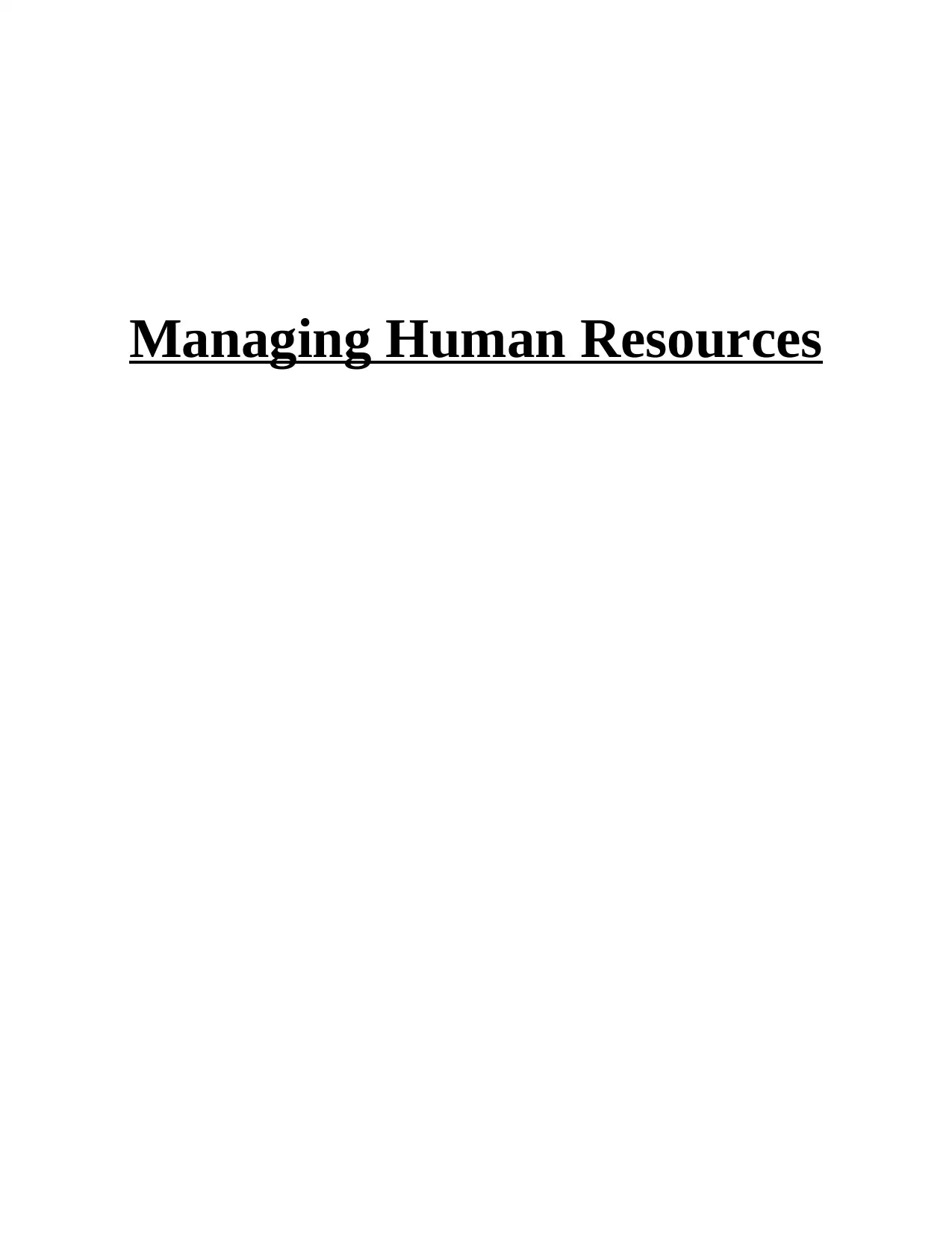
Managing Human Resources
Paraphrase This Document
Need a fresh take? Get an instant paraphrase of this document with our AI Paraphraser
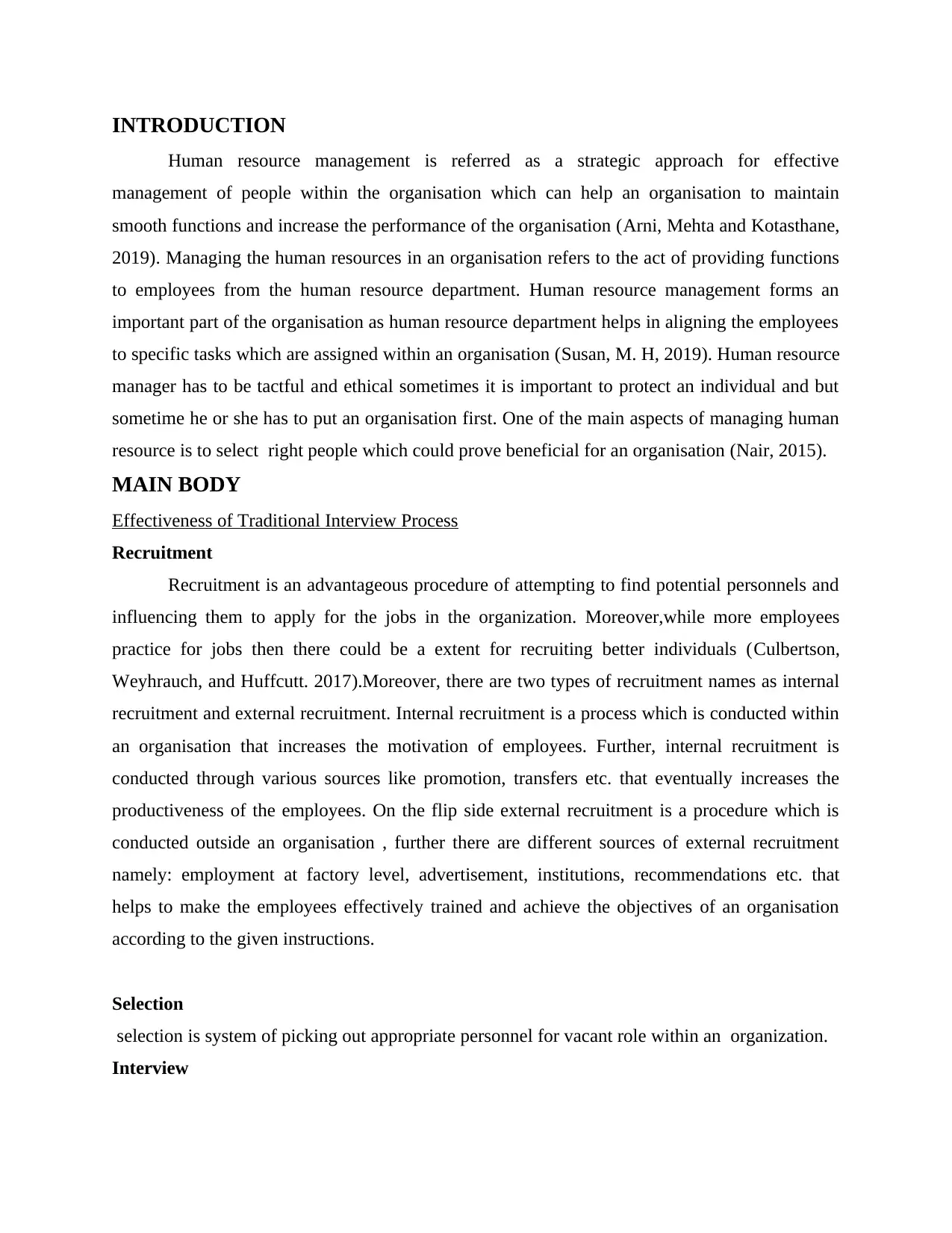
INTRODUCTION
Human resource management is referred as a strategic approach for effective
management of people within the organisation which can help an organisation to maintain
smooth functions and increase the performance of the organisation (Arni, Mehta and Kotasthane,
2019). Managing the human resources in an organisation refers to the act of providing functions
to employees from the human resource department. Human resource management forms an
important part of the organisation as human resource department helps in aligning the employees
to specific tasks which are assigned within an organisation (Susan, M. H, 2019). Human resource
manager has to be tactful and ethical sometimes it is important to protect an individual and but
sometime he or she has to put an organisation first. One of the main aspects of managing human
resource is to select right people which could prove beneficial for an organisation (Nair, 2015).
MAIN BODY
Effectiveness of Traditional Interview Process
Recruitment
Recruitment is an advantageous procedure of attempting to find potential personnels and
influencing them to apply for the jobs in the organization. Moreover,while more employees
practice for jobs then there could be a extent for recruiting better individuals (Culbertson,
Weyhrauch, and Huffcutt. 2017).Moreover, there are two types of recruitment names as internal
recruitment and external recruitment. Internal recruitment is a process which is conducted within
an organisation that increases the motivation of employees. Further, internal recruitment is
conducted through various sources like promotion, transfers etc. that eventually increases the
productiveness of the employees. On the flip side external recruitment is a procedure which is
conducted outside an organisation , further there are different sources of external recruitment
namely: employment at factory level, advertisement, institutions, recommendations etc. that
helps to make the employees effectively trained and achieve the objectives of an organisation
according to the given instructions.
Selection
selection is system of picking out appropriate personnel for vacant role within an organization.
Interview
Human resource management is referred as a strategic approach for effective
management of people within the organisation which can help an organisation to maintain
smooth functions and increase the performance of the organisation (Arni, Mehta and Kotasthane,
2019). Managing the human resources in an organisation refers to the act of providing functions
to employees from the human resource department. Human resource management forms an
important part of the organisation as human resource department helps in aligning the employees
to specific tasks which are assigned within an organisation (Susan, M. H, 2019). Human resource
manager has to be tactful and ethical sometimes it is important to protect an individual and but
sometime he or she has to put an organisation first. One of the main aspects of managing human
resource is to select right people which could prove beneficial for an organisation (Nair, 2015).
MAIN BODY
Effectiveness of Traditional Interview Process
Recruitment
Recruitment is an advantageous procedure of attempting to find potential personnels and
influencing them to apply for the jobs in the organization. Moreover,while more employees
practice for jobs then there could be a extent for recruiting better individuals (Culbertson,
Weyhrauch, and Huffcutt. 2017).Moreover, there are two types of recruitment names as internal
recruitment and external recruitment. Internal recruitment is a process which is conducted within
an organisation that increases the motivation of employees. Further, internal recruitment is
conducted through various sources like promotion, transfers etc. that eventually increases the
productiveness of the employees. On the flip side external recruitment is a procedure which is
conducted outside an organisation , further there are different sources of external recruitment
namely: employment at factory level, advertisement, institutions, recommendations etc. that
helps to make the employees effectively trained and achieve the objectives of an organisation
according to the given instructions.
Selection
selection is system of picking out appropriate personnel for vacant role within an organization.
Interview
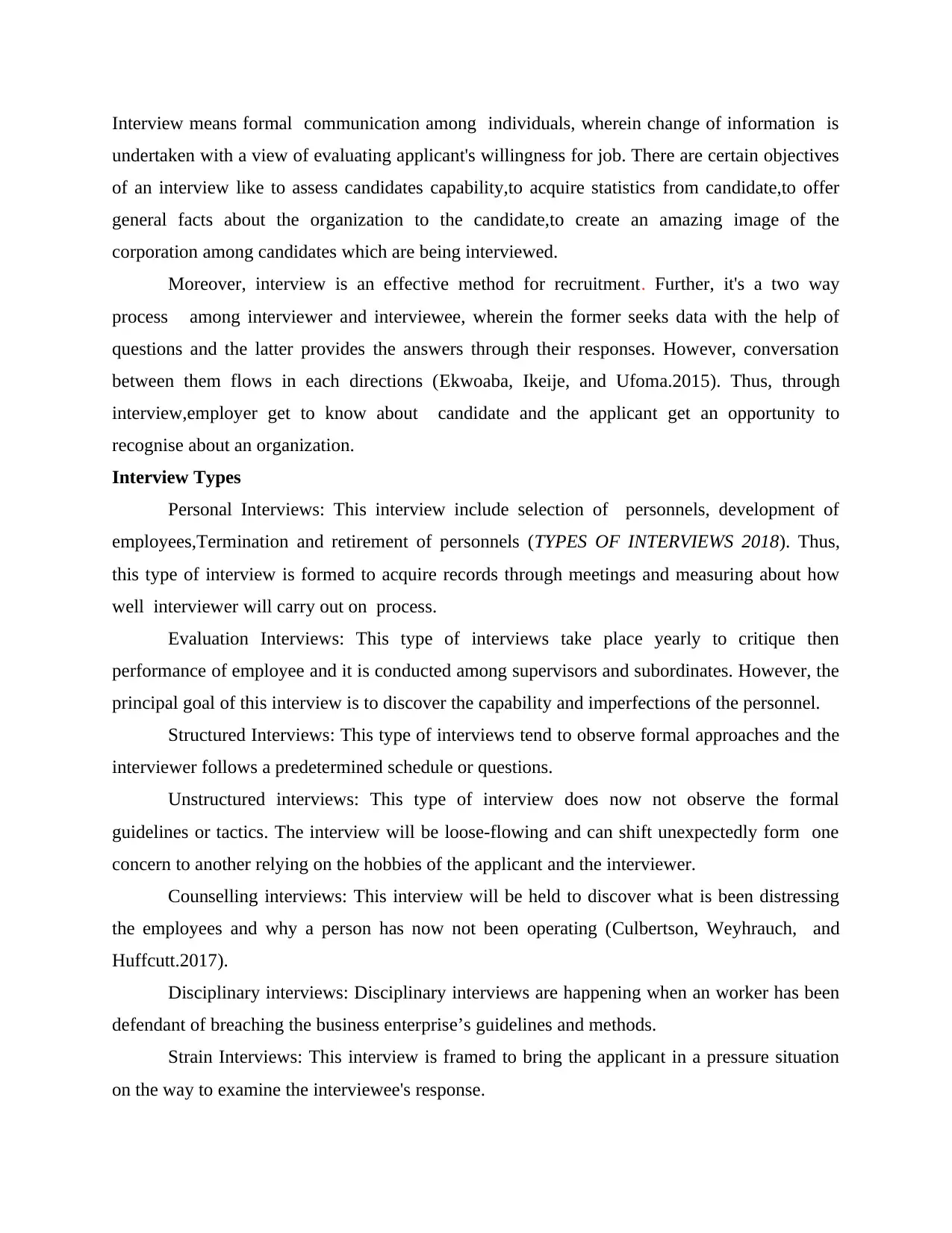
Interview means formal communication among individuals, wherein change of information is
undertaken with a view of evaluating applicant's willingness for job. There are certain objectives
of an interview like to assess candidates capability,to acquire statistics from candidate,to offer
general facts about the organization to the candidate,to create an amazing image of the
corporation among candidates which are being interviewed.
Moreover, interview is an effective method for recruitment. Further, it's a two way
process among interviewer and interviewee, wherein the former seeks data with the help of
questions and the latter provides the answers through their responses. However, conversation
between them flows in each directions (Ekwoaba, Ikeije, and Ufoma.2015). Thus, through
interview,employer get to know about candidate and the applicant get an opportunity to
recognise about an organization.
Interview Types
Personal Interviews: This interview include selection of personnels, development of
employees,Termination and retirement of personnels (TYPES OF INTERVIEWS 2018). Thus,
this type of interview is formed to acquire records through meetings and measuring about how
well interviewer will carry out on process.
Evaluation Interviews: This type of interviews take place yearly to critique then
performance of employee and it is conducted among supervisors and subordinates. However, the
principal goal of this interview is to discover the capability and imperfections of the personnel.
Structured Interviews: This type of interviews tend to observe formal approaches and the
interviewer follows a predetermined schedule or questions.
Unstructured interviews: This type of interview does now not observe the formal
guidelines or tactics. The interview will be loose-flowing and can shift unexpectedly form one
concern to another relying on the hobbies of the applicant and the interviewer.
Counselling interviews: This interview will be held to discover what is been distressing
the employees and why a person has now not been operating (Culbertson, Weyhrauch, and
Huffcutt.2017).
Disciplinary interviews: Disciplinary interviews are happening when an worker has been
defendant of breaching the business enterprise’s guidelines and methods.
Strain Interviews: This interview is framed to bring the applicant in a pressure situation
on the way to examine the interviewee's response.
undertaken with a view of evaluating applicant's willingness for job. There are certain objectives
of an interview like to assess candidates capability,to acquire statistics from candidate,to offer
general facts about the organization to the candidate,to create an amazing image of the
corporation among candidates which are being interviewed.
Moreover, interview is an effective method for recruitment. Further, it's a two way
process among interviewer and interviewee, wherein the former seeks data with the help of
questions and the latter provides the answers through their responses. However, conversation
between them flows in each directions (Ekwoaba, Ikeije, and Ufoma.2015). Thus, through
interview,employer get to know about candidate and the applicant get an opportunity to
recognise about an organization.
Interview Types
Personal Interviews: This interview include selection of personnels, development of
employees,Termination and retirement of personnels (TYPES OF INTERVIEWS 2018). Thus,
this type of interview is formed to acquire records through meetings and measuring about how
well interviewer will carry out on process.
Evaluation Interviews: This type of interviews take place yearly to critique then
performance of employee and it is conducted among supervisors and subordinates. However, the
principal goal of this interview is to discover the capability and imperfections of the personnel.
Structured Interviews: This type of interviews tend to observe formal approaches and the
interviewer follows a predetermined schedule or questions.
Unstructured interviews: This type of interview does now not observe the formal
guidelines or tactics. The interview will be loose-flowing and can shift unexpectedly form one
concern to another relying on the hobbies of the applicant and the interviewer.
Counselling interviews: This interview will be held to discover what is been distressing
the employees and why a person has now not been operating (Culbertson, Weyhrauch, and
Huffcutt.2017).
Disciplinary interviews: Disciplinary interviews are happening when an worker has been
defendant of breaching the business enterprise’s guidelines and methods.
Strain Interviews: This interview is framed to bring the applicant in a pressure situation
on the way to examine the interviewee's response.
⊘ This is a preview!⊘
Do you want full access?
Subscribe today to unlock all pages.

Trusted by 1+ million students worldwide
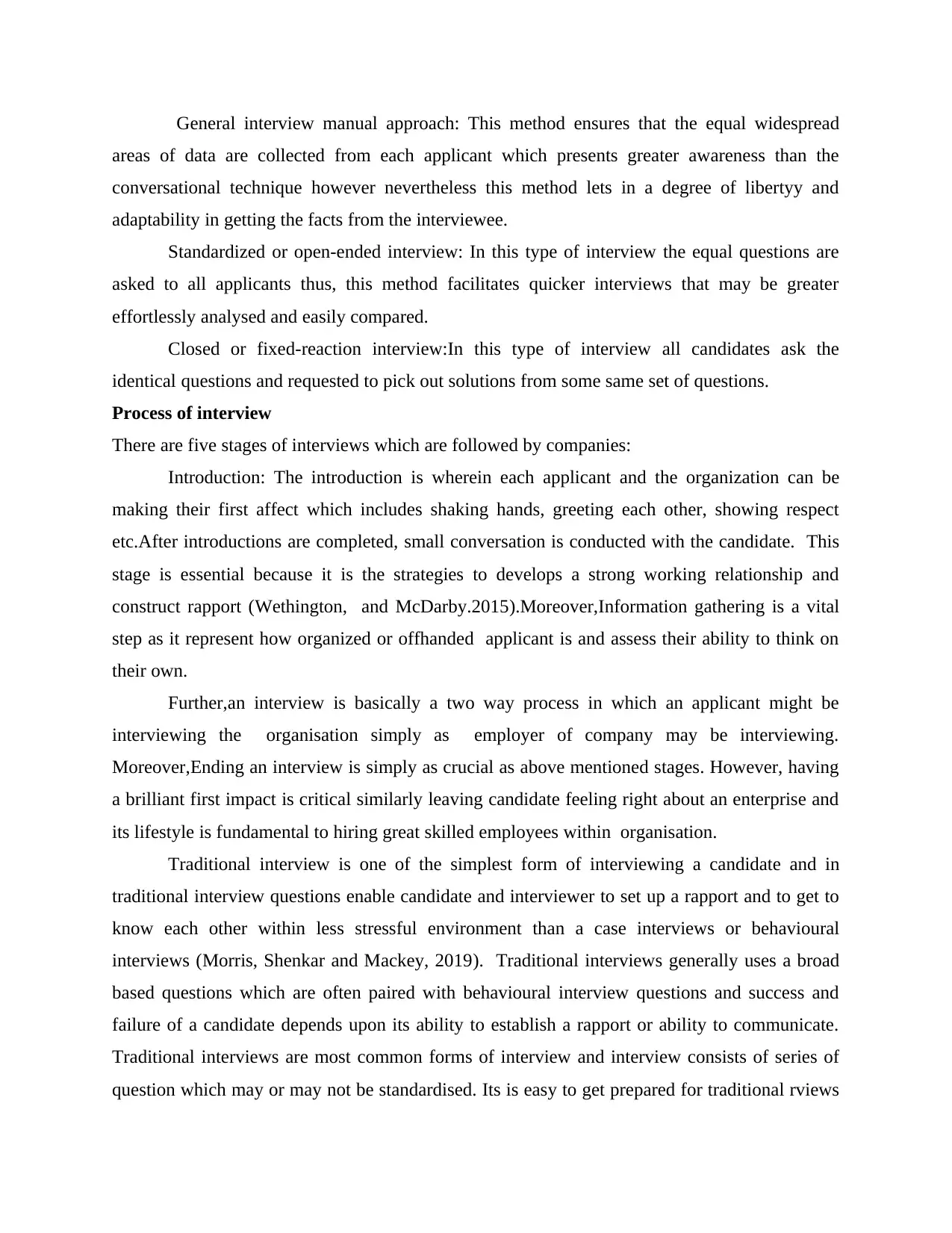
General interview manual approach: This method ensures that the equal widespread
areas of data are collected from each applicant which presents greater awareness than the
conversational technique however nevertheless this method lets in a degree of libertyy and
adaptability in getting the facts from the interviewee.
Standardized or open-ended interview: In this type of interview the equal questions are
asked to all applicants thus, this method facilitates quicker interviews that may be greater
effortlessly analysed and easily compared.
Closed or fixed-reaction interview:In this type of interview all candidates ask the
identical questions and requested to pick out solutions from some same set of questions.
Process of interview
There are five stages of interviews which are followed by companies:
Introduction: The introduction is wherein each applicant and the organization can be
making their first affect which includes shaking hands, greeting each other, showing respect
etc.After introductions are completed, small conversation is conducted with the candidate. This
stage is essential because it is the strategies to develops a strong working relationship and
construct rapport (Wethington, and McDarby.2015).Moreover,Information gathering is a vital
step as it represent how organized or offhanded applicant is and assess their ability to think on
their own.
Further,an interview is basically a two way process in which an applicant might be
interviewing the organisation simply as employer of company may be interviewing.
Moreover,Ending an interview is simply as crucial as above mentioned stages. However, having
a brilliant first impact is critical similarly leaving candidate feeling right about an enterprise and
its lifestyle is fundamental to hiring great skilled employees within organisation.
Traditional interview is one of the simplest form of interviewing a candidate and in
traditional interview questions enable candidate and interviewer to set up a rapport and to get to
know each other within less stressful environment than a case interviews or behavioural
interviews (Morris, Shenkar and Mackey, 2019). Traditional interviews generally uses a broad
based questions which are often paired with behavioural interview questions and success and
failure of a candidate depends upon its ability to establish a rapport or ability to communicate.
Traditional interviews are most common forms of interview and interview consists of series of
question which may or may not be standardised. Its is easy to get prepared for traditional rviews
areas of data are collected from each applicant which presents greater awareness than the
conversational technique however nevertheless this method lets in a degree of libertyy and
adaptability in getting the facts from the interviewee.
Standardized or open-ended interview: In this type of interview the equal questions are
asked to all applicants thus, this method facilitates quicker interviews that may be greater
effortlessly analysed and easily compared.
Closed or fixed-reaction interview:In this type of interview all candidates ask the
identical questions and requested to pick out solutions from some same set of questions.
Process of interview
There are five stages of interviews which are followed by companies:
Introduction: The introduction is wherein each applicant and the organization can be
making their first affect which includes shaking hands, greeting each other, showing respect
etc.After introductions are completed, small conversation is conducted with the candidate. This
stage is essential because it is the strategies to develops a strong working relationship and
construct rapport (Wethington, and McDarby.2015).Moreover,Information gathering is a vital
step as it represent how organized or offhanded applicant is and assess their ability to think on
their own.
Further,an interview is basically a two way process in which an applicant might be
interviewing the organisation simply as employer of company may be interviewing.
Moreover,Ending an interview is simply as crucial as above mentioned stages. However, having
a brilliant first impact is critical similarly leaving candidate feeling right about an enterprise and
its lifestyle is fundamental to hiring great skilled employees within organisation.
Traditional interview is one of the simplest form of interviewing a candidate and in
traditional interview questions enable candidate and interviewer to set up a rapport and to get to
know each other within less stressful environment than a case interviews or behavioural
interviews (Morris, Shenkar and Mackey, 2019). Traditional interviews generally uses a broad
based questions which are often paired with behavioural interview questions and success and
failure of a candidate depends upon its ability to establish a rapport or ability to communicate.
Traditional interviews are most common forms of interview and interview consists of series of
question which may or may not be standardised. Its is easy to get prepared for traditional rviews
Paraphrase This Document
Need a fresh take? Get an instant paraphrase of this document with our AI Paraphraser
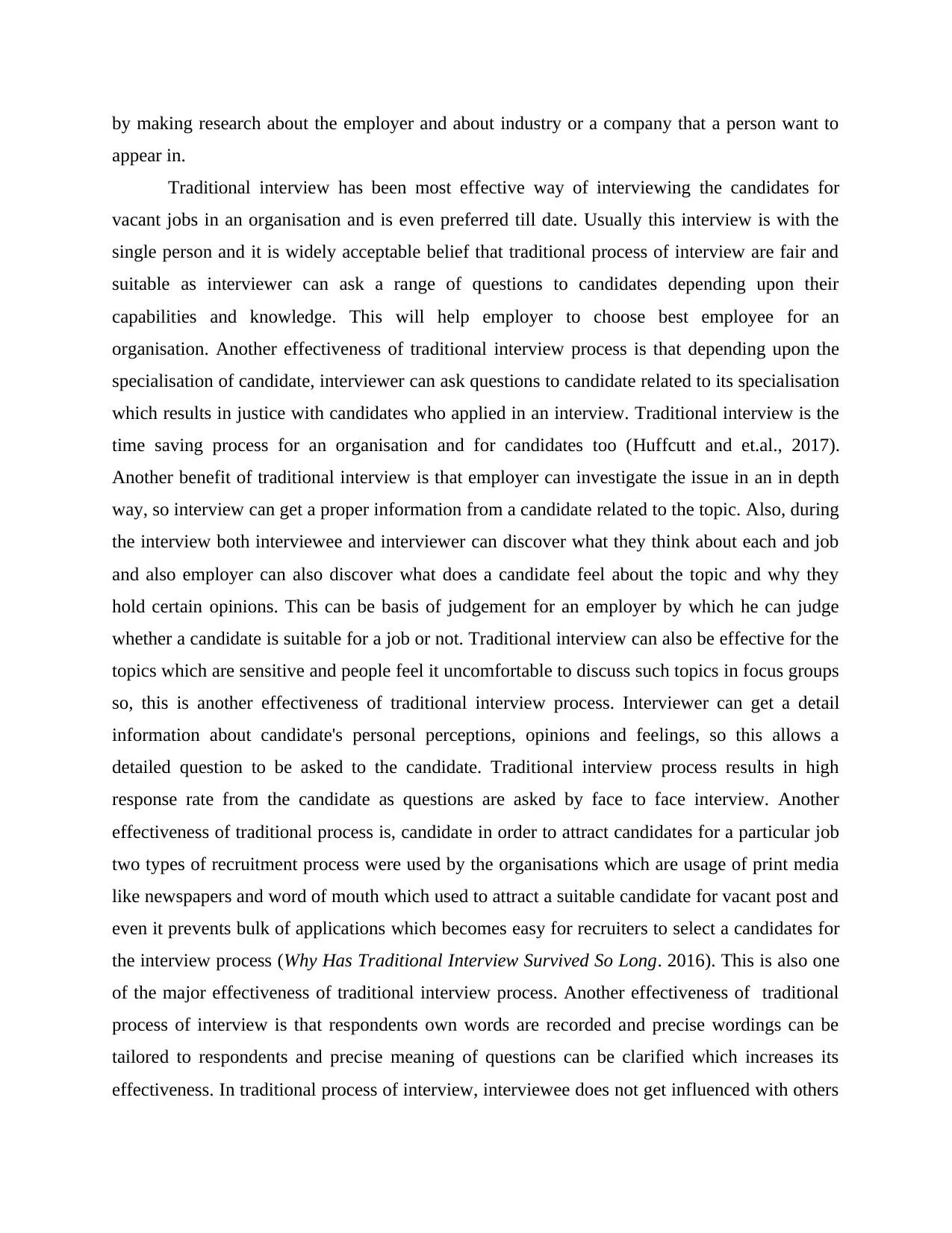
by making research about the employer and about industry or a company that a person want to
appear in.
Traditional interview has been most effective way of interviewing the candidates for
vacant jobs in an organisation and is even preferred till date. Usually this interview is with the
single person and it is widely acceptable belief that traditional process of interview are fair and
suitable as interviewer can ask a range of questions to candidates depending upon their
capabilities and knowledge. This will help employer to choose best employee for an
organisation. Another effectiveness of traditional interview process is that depending upon the
specialisation of candidate, interviewer can ask questions to candidate related to its specialisation
which results in justice with candidates who applied in an interview. Traditional interview is the
time saving process for an organisation and for candidates too (Huffcutt and et.al., 2017).
Another benefit of traditional interview is that employer can investigate the issue in an in depth
way, so interview can get a proper information from a candidate related to the topic. Also, during
the interview both interviewee and interviewer can discover what they think about each and job
and also employer can also discover what does a candidate feel about the topic and why they
hold certain opinions. This can be basis of judgement for an employer by which he can judge
whether a candidate is suitable for a job or not. Traditional interview can also be effective for the
topics which are sensitive and people feel it uncomfortable to discuss such topics in focus groups
so, this is another effectiveness of traditional interview process. Interviewer can get a detail
information about candidate's personal perceptions, opinions and feelings, so this allows a
detailed question to be asked to the candidate. Traditional interview process results in high
response rate from the candidate as questions are asked by face to face interview. Another
effectiveness of traditional process is, candidate in order to attract candidates for a particular job
two types of recruitment process were used by the organisations which are usage of print media
like newspapers and word of mouth which used to attract a suitable candidate for vacant post and
even it prevents bulk of applications which becomes easy for recruiters to select a candidates for
the interview process (Why Has Traditional Interview Survived So Long. 2016). This is also one
of the major effectiveness of traditional interview process. Another effectiveness of traditional
process of interview is that respondents own words are recorded and precise wordings can be
tailored to respondents and precise meaning of questions can be clarified which increases its
effectiveness. In traditional process of interview, interviewee does not get influenced with others
appear in.
Traditional interview has been most effective way of interviewing the candidates for
vacant jobs in an organisation and is even preferred till date. Usually this interview is with the
single person and it is widely acceptable belief that traditional process of interview are fair and
suitable as interviewer can ask a range of questions to candidates depending upon their
capabilities and knowledge. This will help employer to choose best employee for an
organisation. Another effectiveness of traditional interview process is that depending upon the
specialisation of candidate, interviewer can ask questions to candidate related to its specialisation
which results in justice with candidates who applied in an interview. Traditional interview is the
time saving process for an organisation and for candidates too (Huffcutt and et.al., 2017).
Another benefit of traditional interview is that employer can investigate the issue in an in depth
way, so interview can get a proper information from a candidate related to the topic. Also, during
the interview both interviewee and interviewer can discover what they think about each and job
and also employer can also discover what does a candidate feel about the topic and why they
hold certain opinions. This can be basis of judgement for an employer by which he can judge
whether a candidate is suitable for a job or not. Traditional interview can also be effective for the
topics which are sensitive and people feel it uncomfortable to discuss such topics in focus groups
so, this is another effectiveness of traditional interview process. Interviewer can get a detail
information about candidate's personal perceptions, opinions and feelings, so this allows a
detailed question to be asked to the candidate. Traditional interview process results in high
response rate from the candidate as questions are asked by face to face interview. Another
effectiveness of traditional process is, candidate in order to attract candidates for a particular job
two types of recruitment process were used by the organisations which are usage of print media
like newspapers and word of mouth which used to attract a suitable candidate for vacant post and
even it prevents bulk of applications which becomes easy for recruiters to select a candidates for
the interview process (Why Has Traditional Interview Survived So Long. 2016). This is also one
of the major effectiveness of traditional interview process. Another effectiveness of traditional
process of interview is that respondents own words are recorded and precise wordings can be
tailored to respondents and precise meaning of questions can be clarified which increases its
effectiveness. In traditional process of interview, interviewee does not get influenced with others
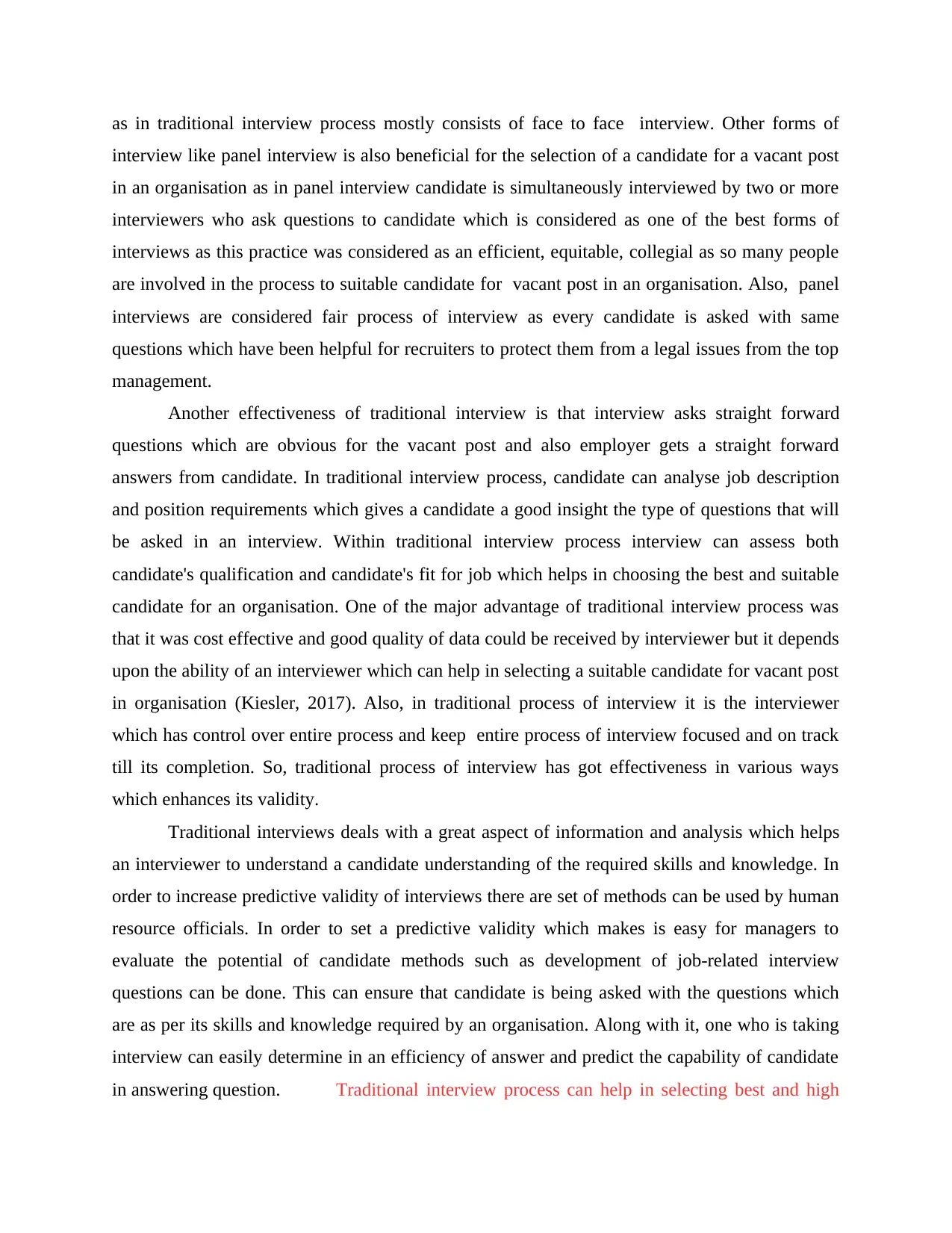
as in traditional interview process mostly consists of face to face interview. Other forms of
interview like panel interview is also beneficial for the selection of a candidate for a vacant post
in an organisation as in panel interview candidate is simultaneously interviewed by two or more
interviewers who ask questions to candidate which is considered as one of the best forms of
interviews as this practice was considered as an efficient, equitable, collegial as so many people
are involved in the process to suitable candidate for vacant post in an organisation. Also, panel
interviews are considered fair process of interview as every candidate is asked with same
questions which have been helpful for recruiters to protect them from a legal issues from the top
management.
Another effectiveness of traditional interview is that interview asks straight forward
questions which are obvious for the vacant post and also employer gets a straight forward
answers from candidate. In traditional interview process, candidate can analyse job description
and position requirements which gives a candidate a good insight the type of questions that will
be asked in an interview. Within traditional interview process interview can assess both
candidate's qualification and candidate's fit for job which helps in choosing the best and suitable
candidate for an organisation. One of the major advantage of traditional interview process was
that it was cost effective and good quality of data could be received by interviewer but it depends
upon the ability of an interviewer which can help in selecting a suitable candidate for vacant post
in organisation (Kiesler, 2017). Also, in traditional process of interview it is the interviewer
which has control over entire process and keep entire process of interview focused and on track
till its completion. So, traditional process of interview has got effectiveness in various ways
which enhances its validity.
Traditional interviews deals with a great aspect of information and analysis which helps
an interviewer to understand a candidate understanding of the required skills and knowledge. In
order to increase predictive validity of interviews there are set of methods can be used by human
resource officials. In order to set a predictive validity which makes is easy for managers to
evaluate the potential of candidate methods such as development of job-related interview
questions can be done. This can ensure that candidate is being asked with the questions which
are as per its skills and knowledge required by an organisation. Along with it, one who is taking
interview can easily determine in an efficiency of answer and predict the capability of candidate
in answering question. Traditional interview process can help in selecting best and high
interview like panel interview is also beneficial for the selection of a candidate for a vacant post
in an organisation as in panel interview candidate is simultaneously interviewed by two or more
interviewers who ask questions to candidate which is considered as one of the best forms of
interviews as this practice was considered as an efficient, equitable, collegial as so many people
are involved in the process to suitable candidate for vacant post in an organisation. Also, panel
interviews are considered fair process of interview as every candidate is asked with same
questions which have been helpful for recruiters to protect them from a legal issues from the top
management.
Another effectiveness of traditional interview is that interview asks straight forward
questions which are obvious for the vacant post and also employer gets a straight forward
answers from candidate. In traditional interview process, candidate can analyse job description
and position requirements which gives a candidate a good insight the type of questions that will
be asked in an interview. Within traditional interview process interview can assess both
candidate's qualification and candidate's fit for job which helps in choosing the best and suitable
candidate for an organisation. One of the major advantage of traditional interview process was
that it was cost effective and good quality of data could be received by interviewer but it depends
upon the ability of an interviewer which can help in selecting a suitable candidate for vacant post
in organisation (Kiesler, 2017). Also, in traditional process of interview it is the interviewer
which has control over entire process and keep entire process of interview focused and on track
till its completion. So, traditional process of interview has got effectiveness in various ways
which enhances its validity.
Traditional interviews deals with a great aspect of information and analysis which helps
an interviewer to understand a candidate understanding of the required skills and knowledge. In
order to increase predictive validity of interviews there are set of methods can be used by human
resource officials. In order to set a predictive validity which makes is easy for managers to
evaluate the potential of candidate methods such as development of job-related interview
questions can be done. This can ensure that candidate is being asked with the questions which
are as per its skills and knowledge required by an organisation. Along with it, one who is taking
interview can easily determine in an efficiency of answer and predict the capability of candidate
in answering question. Traditional interview process can help in selecting best and high
⊘ This is a preview!⊘
Do you want full access?
Subscribe today to unlock all pages.

Trusted by 1+ million students worldwide
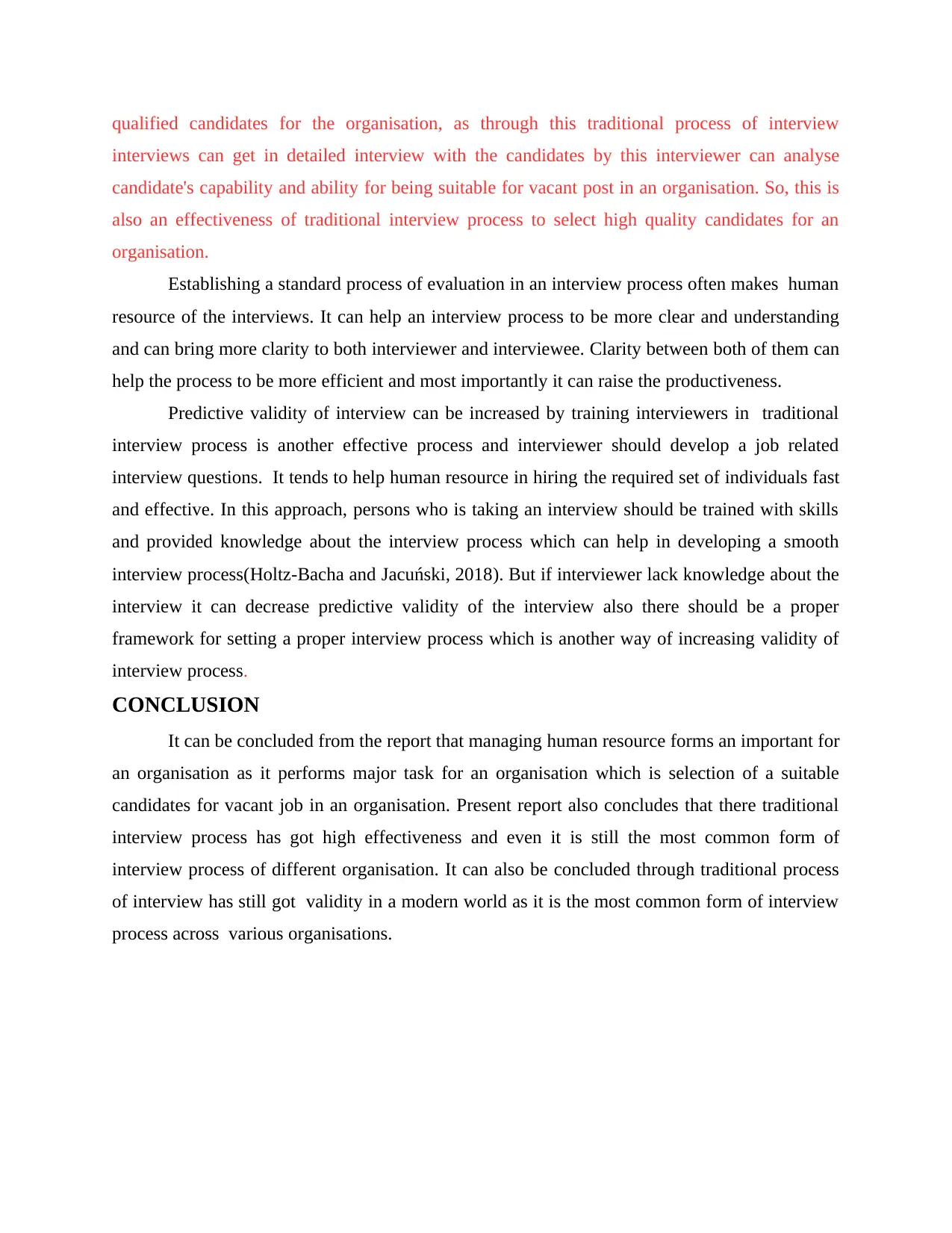
qualified candidates for the organisation, as through this traditional process of interview
interviews can get in detailed interview with the candidates by this interviewer can analyse
candidate's capability and ability for being suitable for vacant post in an organisation. So, this is
also an effectiveness of traditional interview process to select high quality candidates for an
organisation.
Establishing a standard process of evaluation in an interview process often makes human
resource of the interviews. It can help an interview process to be more clear and understanding
and can bring more clarity to both interviewer and interviewee. Clarity between both of them can
help the process to be more efficient and most importantly it can raise the productiveness.
Predictive validity of interview can be increased by training interviewers in traditional
interview process is another effective process and interviewer should develop a job related
interview questions. It tends to help human resource in hiring the required set of individuals fast
and effective. In this approach, persons who is taking an interview should be trained with skills
and provided knowledge about the interview process which can help in developing a smooth
interview process(Holtz-Bacha and Jacuński, 2018). But if interviewer lack knowledge about the
interview it can decrease predictive validity of the interview also there should be a proper
framework for setting a proper interview process which is another way of increasing validity of
interview process.
CONCLUSION
It can be concluded from the report that managing human resource forms an important for
an organisation as it performs major task for an organisation which is selection of a suitable
candidates for vacant job in an organisation. Present report also concludes that there traditional
interview process has got high effectiveness and even it is still the most common form of
interview process of different organisation. It can also be concluded through traditional process
of interview has still got validity in a modern world as it is the most common form of interview
process across various organisations.
interviews can get in detailed interview with the candidates by this interviewer can analyse
candidate's capability and ability for being suitable for vacant post in an organisation. So, this is
also an effectiveness of traditional interview process to select high quality candidates for an
organisation.
Establishing a standard process of evaluation in an interview process often makes human
resource of the interviews. It can help an interview process to be more clear and understanding
and can bring more clarity to both interviewer and interviewee. Clarity between both of them can
help the process to be more efficient and most importantly it can raise the productiveness.
Predictive validity of interview can be increased by training interviewers in traditional
interview process is another effective process and interviewer should develop a job related
interview questions. It tends to help human resource in hiring the required set of individuals fast
and effective. In this approach, persons who is taking an interview should be trained with skills
and provided knowledge about the interview process which can help in developing a smooth
interview process(Holtz-Bacha and Jacuński, 2018). But if interviewer lack knowledge about the
interview it can decrease predictive validity of the interview also there should be a proper
framework for setting a proper interview process which is another way of increasing validity of
interview process.
CONCLUSION
It can be concluded from the report that managing human resource forms an important for
an organisation as it performs major task for an organisation which is selection of a suitable
candidates for vacant job in an organisation. Present report also concludes that there traditional
interview process has got high effectiveness and even it is still the most common form of
interview process of different organisation. It can also be concluded through traditional process
of interview has still got validity in a modern world as it is the most common form of interview
process across various organisations.
Paraphrase This Document
Need a fresh take? Get an instant paraphrase of this document with our AI Paraphraser

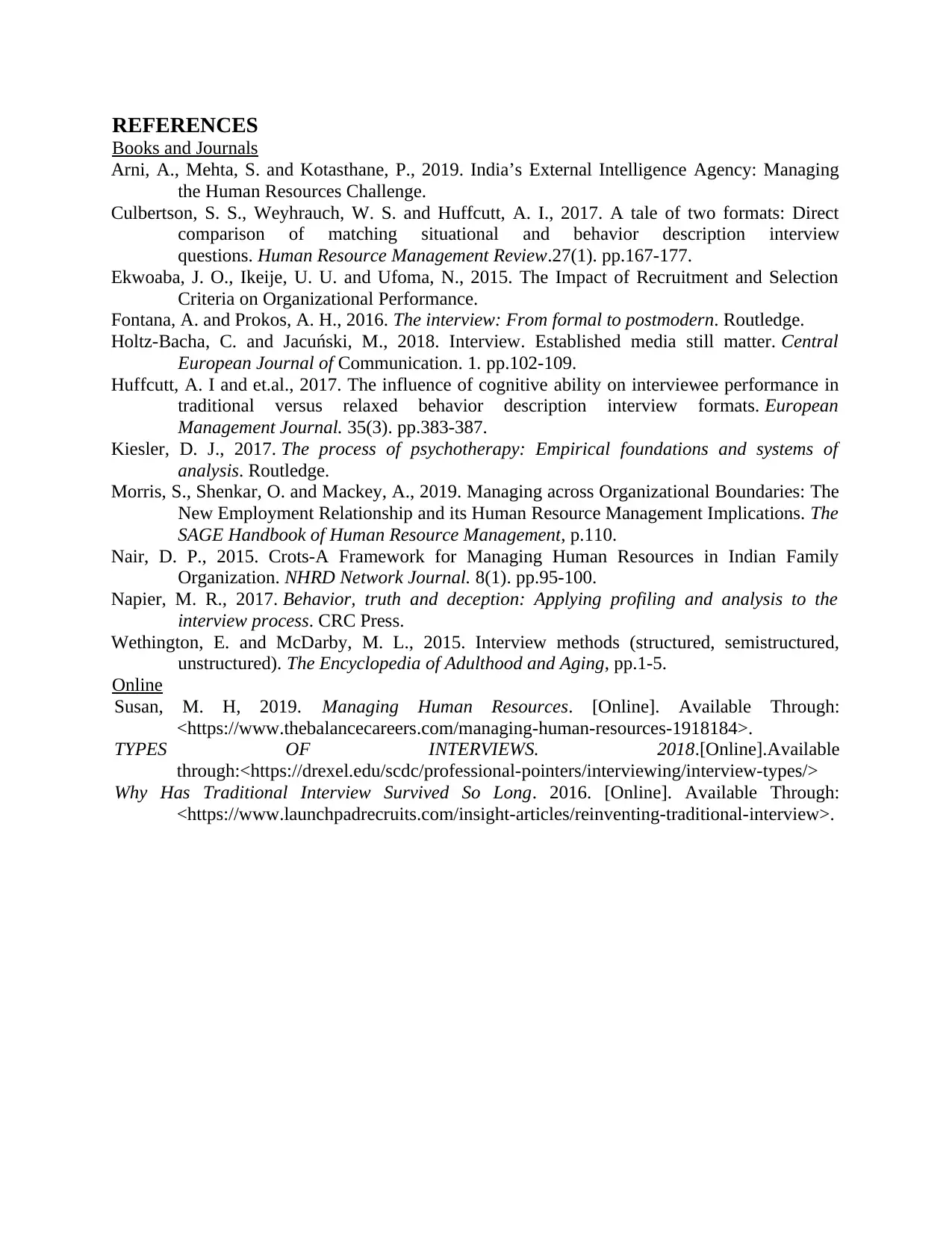
REFERENCES
Books and Journals
Arni, A., Mehta, S. and Kotasthane, P., 2019. India’s External Intelligence Agency: Managing
the Human Resources Challenge.
Culbertson, S. S., Weyhrauch, W. S. and Huffcutt, A. I., 2017. A tale of two formats: Direct
comparison of matching situational and behavior description interview
questions. Human Resource Management Review.27(1). pp.167-177.
Ekwoaba, J. O., Ikeije, U. U. and Ufoma, N., 2015. The Impact of Recruitment and Selection
Criteria on Organizational Performance.
Fontana, A. and Prokos, A. H., 2016. The interview: From formal to postmodern. Routledge.
Holtz-Bacha, C. and Jacuński, M., 2018. Interview. Established media still matter. Central
European Journal of Communication. 1. pp.102-109.
Huffcutt, A. I and et.al., 2017. The influence of cognitive ability on interviewee performance in
traditional versus relaxed behavior description interview formats. European
Management Journal. 35(3). pp.383-387.
Kiesler, D. J., 2017. The process of psychotherapy: Empirical foundations and systems of
analysis. Routledge.
Morris, S., Shenkar, O. and Mackey, A., 2019. Managing across Organizational Boundaries: The
New Employment Relationship and its Human Resource Management Implications. The
SAGE Handbook of Human Resource Management, p.110.
Nair, D. P., 2015. Crots-A Framework for Managing Human Resources in Indian Family
Organization. NHRD Network Journal. 8(1). pp.95-100.
Napier, M. R., 2017. Behavior, truth and deception: Applying profiling and analysis to the
interview process. CRC Press.
Wethington, E. and McDarby, M. L., 2015. Interview methods (structured, semistructured,
unstructured). The Encyclopedia of Adulthood and Aging, pp.1-5.
Online
Susan, M. H, 2019. Managing Human Resources. [Online]. Available Through:
<https://www.thebalancecareers.com/managing-human-resources-1918184>.
TYPES OF INTERVIEWS. 2018.[Online].Available
through:<https://drexel.edu/scdc/professional-pointers/interviewing/interview-types/>
Why Has Traditional Interview Survived So Long. 2016. [Online]. Available Through:
<https://www.launchpadrecruits.com/insight-articles/reinventing-traditional-interview>.
Books and Journals
Arni, A., Mehta, S. and Kotasthane, P., 2019. India’s External Intelligence Agency: Managing
the Human Resources Challenge.
Culbertson, S. S., Weyhrauch, W. S. and Huffcutt, A. I., 2017. A tale of two formats: Direct
comparison of matching situational and behavior description interview
questions. Human Resource Management Review.27(1). pp.167-177.
Ekwoaba, J. O., Ikeije, U. U. and Ufoma, N., 2015. The Impact of Recruitment and Selection
Criteria on Organizational Performance.
Fontana, A. and Prokos, A. H., 2016. The interview: From formal to postmodern. Routledge.
Holtz-Bacha, C. and Jacuński, M., 2018. Interview. Established media still matter. Central
European Journal of Communication. 1. pp.102-109.
Huffcutt, A. I and et.al., 2017. The influence of cognitive ability on interviewee performance in
traditional versus relaxed behavior description interview formats. European
Management Journal. 35(3). pp.383-387.
Kiesler, D. J., 2017. The process of psychotherapy: Empirical foundations and systems of
analysis. Routledge.
Morris, S., Shenkar, O. and Mackey, A., 2019. Managing across Organizational Boundaries: The
New Employment Relationship and its Human Resource Management Implications. The
SAGE Handbook of Human Resource Management, p.110.
Nair, D. P., 2015. Crots-A Framework for Managing Human Resources in Indian Family
Organization. NHRD Network Journal. 8(1). pp.95-100.
Napier, M. R., 2017. Behavior, truth and deception: Applying profiling and analysis to the
interview process. CRC Press.
Wethington, E. and McDarby, M. L., 2015. Interview methods (structured, semistructured,
unstructured). The Encyclopedia of Adulthood and Aging, pp.1-5.
Online
Susan, M. H, 2019. Managing Human Resources. [Online]. Available Through:
<https://www.thebalancecareers.com/managing-human-resources-1918184>.
TYPES OF INTERVIEWS. 2018.[Online].Available
through:<https://drexel.edu/scdc/professional-pointers/interviewing/interview-types/>
Why Has Traditional Interview Survived So Long. 2016. [Online]. Available Through:
<https://www.launchpadrecruits.com/insight-articles/reinventing-traditional-interview>.
⊘ This is a preview!⊘
Do you want full access?
Subscribe today to unlock all pages.

Trusted by 1+ million students worldwide
1 out of 9
Related Documents
Your All-in-One AI-Powered Toolkit for Academic Success.
+13062052269
info@desklib.com
Available 24*7 on WhatsApp / Email
![[object Object]](/_next/static/media/star-bottom.7253800d.svg)
Unlock your academic potential
Copyright © 2020–2026 A2Z Services. All Rights Reserved. Developed and managed by ZUCOL.




